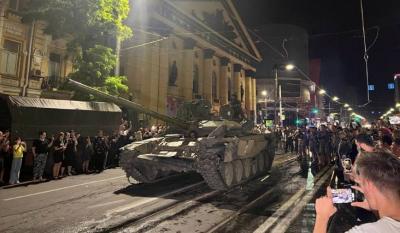The Mayor of Moscow, Sergey Sobyanin, announced on Monday that the anti-terrorism restrictions imposed in the city during the events of last Saturday, which authorities described as an armed rebellion by the Wagner military group, have been lifted.
Russian media reported that similar restrictions were also lifted in the Voronezh and Moscow Regions. The Russian National Anti-Terrorism Committee stated that the situation in the country is "stable." Meanwhile, Russian Prime Minister Mikhail Mishustin confirmed during a televised government meeting that Russia faced a "challenge to its stability," asserting that "the country must remain united behind President Vladimir Putin."
Anti-terrorism measures were put in place in the three regions on Saturday as a convoy of Wagner fighters moved towards Moscow, engaging in gunfire with security forces.
The Russian news agency reported that the U.S. Embassy in Russia has communicated with the Russian Foreign Ministry to discuss the security situation following the rebellion by the Wagner military group, led by its chief, Yevgeny Prigozhin.
European Union foreign policy chief Josep Borrell stated on Monday that the "failed" rebellion by Wagner revealed cracks in Moscow's military power due to its war on Ukraine. In comments to reporters in Luxembourg ahead of a meeting of EU foreign ministers, he said, "The political system suffers from weaknesses, and military power is fracturing." Borrell emphasized that "it is not good to see a nuclear power like Russia entering a phase of political instability," considering this "the right moment for the EU to continue supporting Ukraine more than ever." He added, "The monster created by Putin with Wagner is now being eaten by the monster; it acts against its creator."
NATO Secretary-General Jens Stoltenberg opined on Monday that the Wagner group's rebellion shows that Moscow made a strategic error by waging war on Ukraine. He told reporters during a visit to Lithuania that "the events that occurred are an internal Russian matter, and are further evidence of the major strategic mistake made by President Vladimir Putin with the illegal annexation of Crimea and the war against Ukraine." He stated, "As Russia continues its assault, it is important that we continue our support for Ukraine."
British Prime Minister Rishi Sunak said on Monday that Britain is prepared for a range of scenarios in Russia, highlighting the potential destabilizing effect of tensions between Wagner and Putin. Sunak told reporters, "It is too early to conclude what consequences may arise from this, but we are, of course, prepared as we have always been for a range of scenarios."
British Foreign Secretary James Cleverly noted that the unfinished rebellion by the Wagner military group under Yevgeny Prigozhin posed an unprecedented challenge to President Putin. He stated in Parliament, "Prigozhin’s rebellion is an unprecedented challenge to President Putin's authority, and it is clear that cracks are appearing in Russia’s support for the war."
Luxembourg's Foreign Minister Jean Asselborn warned on Monday that "the destabilization of Russia would pose a significant risk to Europe," pointing out that "Moscow possesses about 6,000 nuclear warheads." He told reporters upon arriving for a meeting with his EU counterparts in Luxembourg that "the collapse of the world's largest country, in terms of nuclear arsenal, would certainly be dangerous for Europe."
German Foreign Minister Annalena Baerbock affirmed that Germany will not interfere in Russia's internal political affairs, indicating that "Putin is destroying his country with the war on Ukraine." Before heading to the EU Foreign Ministers' meeting, Baerbock stated, "We see significant cracks in Russian propaganda. Allies will continue to support Ukraine in the war."
A spokesperson for the German government noted that Berlin hopes for stability in Russia following the Wagner rebellion. Responding to a question at a regular press conference, the spokesperson stated that the German government does not take sides in this crisis.
As of Monday, Russia is seeking to restore calm after the failure of the Wagner group's rebellion, while Western allies are assessing how President Putin may reassert control over power and what that might mean for the war in Ukraine. Moscow has declared Monday a public holiday to allow time for the country to regain tranquility, and there were few signs of increased security measures in the Russian capital as of Sunday evening.




